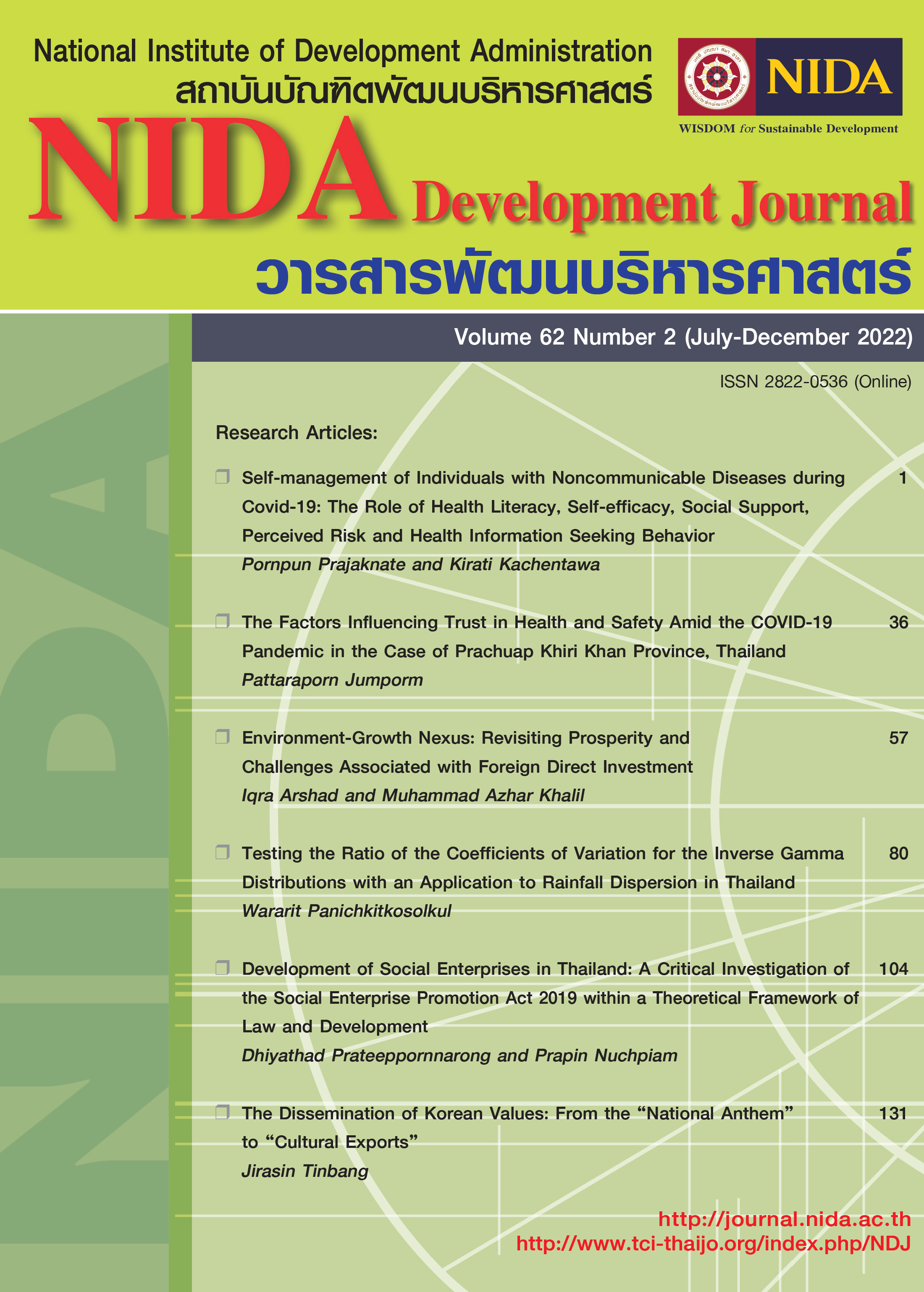The Factors Influencing Trust in Health and Safety Amid the COVID-19 Pandemic in the Case of Prachuap Khiri Khan Province, Thailand
Keywords:
tourist, trust, health safety, decisionAbstract
The current global situation of COVID-19 has severely affected Thailand’s tourism. This study aims 1) to study the levels of tourists’ trust in health and safety amid the COVID-19 pandemic in Prachuap Khiri Khan Province; and 2) to study the factors that affect tourists’ trust in health and safety amid the pandemic there. This study employed quantitative research methodology, and a questionnaire was used as the instrument for collecting the data. The sample groups were tourists for a total of 214 people from Prachuap Khiri Khan Province. The data analysis technique employed frequency, percentage, standard deviation distribution, and inferential statistics, such as Pearson’s correlation coefficient analysis and path analysis using multiple regression analysis techniques. The findings of this research reveal that tourists that have decided to travel to Prachuap Khiri Khan Province amid the COVID-19 pandemic have a high level of trust in the overall health and safety measures. The factors that were seen to significantly influence the tourists’ trust in health and safety were their perception and attitude. Personal factors such as income, perception and attitude indirectly influenced on tourist decisions through tourist trust variables. Only age factor did not directly or indirectly influence on tourist decisions.
References
Attanit, R. 2011. Employee engagement. Bangkok: HR Center.
Department of Tourism. (2563). Tourism statistics in 2020. Retrieved January 10 2020, from http:// www.mots.go.th/more_news_new.php?cid=592.
Janchai, N. (2020) Tourists’ Trust towards Healthcare Service Quality. Nakhorn Ratchasima: Suranaree University of Technology.
Juvan, E., Omerzel, D. G., and Maravic, M. U. (2017). Tourist Behaviour : An Overview of Models to Date. MIC 2017: Managing the Global Economy; Proceedings of the Joint International Conference, Monastier di Treviso Italy, 24–27 May 2017, University of Primorska Press.
Khwanmuang, L. (2016). Trust Promoting for Continuing to make electronic wallet transactions. Bangkok: Thammasat University.
Krungthai. (2020). Delving into tourists’ behavior during new normal period: when covid changes our lives. Retrieved January 26 2020, from https://bit.ly/3cfJM2A.
Kotler, P. and Keller, K. (2006). Marketing Management. 12th Ed. Prentice Hall, Upper Saddle River.
Lueangthitikanchana, K. (2016). Factors affecting thai consumer decisions to travel to Taiwan. Bangkok: Thammasat University.
Mcshane, S. L. and Von Glinow, M. A. (2005). Organizational Behavior. 3rd ed. New York: McGraw-Hill.
OECD. (2020). Tourism Policy Responses to the coronavirus (COVID-19) Updated 2 June 2020. Retrieved January 25 2020, from https://read.oecdilibrary.org/view/?ref=124_1249847 uf8nm95se&title=Covid-19_Tourism_Policy_Responses
Pairojpiriyakul, A. and Taweepornpathomgul, S. (2012). Factors Affecting Thai Tourist’s Decision to visit Muang Luang Prabang . Journal of Sports Science and Health 13(1).
Rodkiln, P. (2019). Factors Influencing Trust and Decision to Buy Gems and Jewelry Products Through Facebook Live Channel of Thai Consumers. Prince of Songkhla University
Samart, W. (2014). Antecedents and Differences between Trust in Team and Organization Engagement between Employees Working in Traditional Team and Virtual Team: A Case Study of Companies in Aviation Industry. Bangkok: National Institute of Development Administration.
Schiffman, L.G., & Kanuk, L.L. (2007). Consumer behavior. 9th ed. New Jersey: Prentice – Hall.
Seangsawat, M. (2015). The Trust and loyalty that influence the decision to access the department services. A case study of the department stores in Bangkok. Bangkok : Bangkok University.
Taerungreaung, N. (2019). Factors that influence the trust in using applications (KMA) of Bank of Ayudhya public company limited bank’s customers. Nakornpathom: Silpakorn University.
Tassawa, C. and Banjongprasert, J. (2019). The Effects of Destination Competitiveness and
Tourist Trust on Destination Advocacy: The Case of International tourists. Humanities,
Social Sciences, and Arts12(5).
Tianprapakun, M. (2013). Factors affecting to safety behavior of Olefins1’s officer at PTT Global Chemical Public Company limited Branch2. Bangkok: National Institute of Development Administration.
Ukpabi, D., Olaleye, S. and Karjaluoto, H. (2021). Factors Influencing Tourists’ Intention to Use COVID-19 Contact Tracing App. Information and Communication Technologies in Tourism 2021, 504-516.
United Nations World Tourism Organization. (2008). International recommendations for statistics 2008. Retrieved January 15 2020, from https://unstats.un.org/unsd/publication/seriesm/series m_83rev1e.pdf
United Nations World Tourism Organization. (2020). How are countries supporting tourism recovery?. Retrieved January 26 2020, from https://webunwto.s3.eu-west-1.amazonaws .com/s3fs-public/2020-06/BFN_V4.pdf
World Health Organization. (2014). BASIC DOCUMENTS. 48th ed. Retrieved January 20 2020, from https://apps.who.int/gb/bd/PDF/bd48/basic-documents-48th-edition-en.pdf.
Downloads
Published
How to Cite
Issue
Section
License
Copyright (c) 2022 NIDA Development Journal

This work is licensed under a Creative Commons Attribution-NonCommercial-NoDerivatives 4.0 International License.





